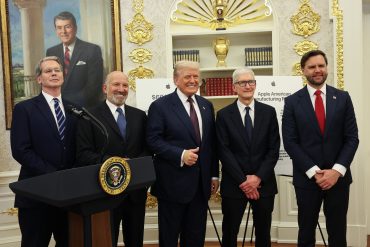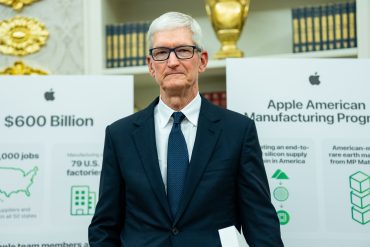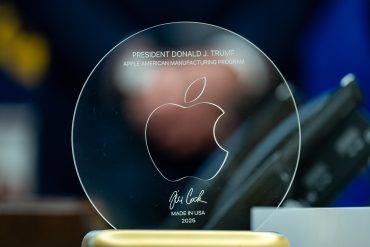
- Global Trade
- Tariffs
- Tech Reshoring
Apple Commits $100B to Reshore iPhone Output as Tariffs Rise
5 minute read

Apple’s $100 billion manufacturing investment aims to relocate iPhone production amid escalating trade pressures and tariff costs
Key Takeaways
- $100 billion U.S. investment announced by Apple and President Trump, bringing Apple’s total domestic commitment to $600 billion over four years through a new “American Manufacturing Program.”
- Stock price surges 6% in midday trading as investors welcome Apple’s strategy to mitigate tariff exposure, with the company already incurring $800 million in trade-related costs.
- iPhone prices could reach $3,500 if fully manufactured domestically, with analysts warning the supply chain shift will require at least five years to complete.
Introduction
Apple commits to a massive $100 billion investment in U.S. manufacturing as part of a White House announcement that underscores the growing pressure on tech giants to relocate production domestically. The investment, revealed Wednesday afternoon, establishes Apple’s “American Manufacturing Program” designed to bring critical supply chain operations to the United States.
President Trump’s administration frames the commitment as a strategic victory for American manufacturing and national security. The move responds directly to escalating tariff threats, with Trump previously warning of 25% levies on foreign-made iPhones if production remains overseas.
Key Developments
The White House announcement at 4:30 p.m. EDT formalized Apple’s expanded domestic manufacturing strategy. Apple CEO Tim Cook participates in the event, signaling the company’s direct engagement with the administration’s reshoring agenda.
The program builds on Apple’s existing U.S. manufacturing footprint, which includes glass displays and facial recognition modules. Cook recently emphasized the company’s current production of approximately 19 billion chips domestically, with plans for significant expansion.
Trump’s pressure campaign intensified through direct communications with Cook and public statements on Truth Social. “I have long ago informed Tim Cook of Apple that I expect their iPhones that will be sold in the United States of America will be manufactured and built in the United States, not India, or anyplace else,” Trump posted in May.

Market Impact
Apple shares surge 6% in midday trading following the announcement, marking the stock’s biggest single-day gain since May. The rally reflects investor relief over the company’s proactive approach to trade tensions.
Despite Wednesday’s gains, Apple stock remains down 16% year-to-date, partly attributed to challenges in the artificial intelligence sector. Nancy Tengler, CEO of Laffer Tengler Investments, notes the positive market reaction stems from Cook “extending an olive branch” to the Trump administration.
The company’s tariff burden creates immediate financial pressure, with $800 million already incurred and $1.1 billion projected for the upcoming fiscal quarter. These costs underscore the economic rationale behind domestic manufacturing expansion.
Strategic Insights
Apple’s commitment represents a fundamental shift in tech industry supply chain strategy, moving beyond cost optimization toward geopolitical risk management. The investment addresses mounting concerns over supply chain vulnerabilities and trade policy unpredictability.
The initiative positions Apple as a leader in manufacturing reshoring, potentially influencing other tech companies to follow similar strategies. White House spokesperson Taylor Rogers emphasizes the program will “incentivize global companies to manufacture even more critical components in the United States.”
However, the transition presents significant operational challenges. Complete supply chain relocation could drive iPhone prices to $3,500, reflecting higher U.S. labor and infrastructure costs compared to current manufacturing locations.
Expert Opinions and Data
Industry analysts caution that meaningful supply chain transformation requires substantial time and investment. “Shifting Apple’s global supply chain to the U.S. will take years—potentially five or more,” according to supply chain experts monitoring the initiative.
Cook addresses the gradual nature of expansion during recent investor calls, highlighting current domestic component production while acknowledging the multi-year timeline for broader manufacturing integration. “We’re doing more in this country, and that’s on top of having roughly 19 billion chips coming out of the US now, and we will do more,” Cook told analysts.
The investment complements recent partnerships, including a $500 million deal with MP Materials for Texas-based magnet production using recycled materials. Additional facilities include AI server infrastructure near Houston and Apple Silicon production in Phoenix.

Conclusion
Apple’s $100 billion manufacturing commitment establishes a new paradigm for tech industry supply chain strategy, balancing political requirements with operational realities. The investment provides tariff protection while supporting the administration’s manufacturing agenda, though implementation challenges remain substantial.
The announcement signals broader industry trends toward domestic production amid rising geopolitical tensions. Apple’s approach demonstrates how major technology companies navigate trade policy pressures while maintaining competitive positioning in global markets.







